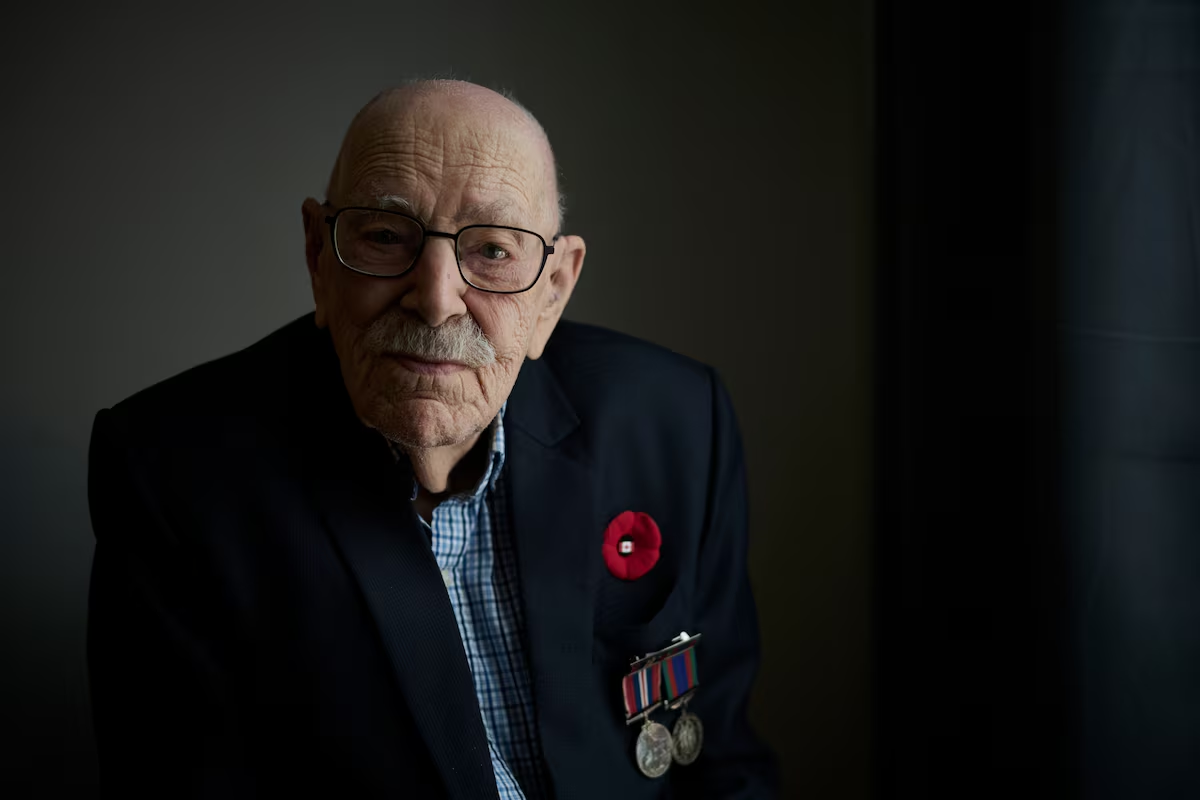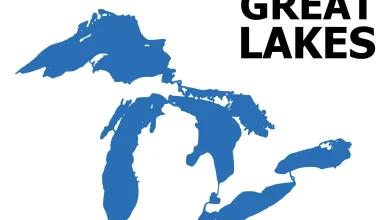Second World War veterans are a shrinking presence on Remembrance Day

Open this photo in gallery:
The dwindling population of Second World War veterans makes 103-year-old Elmer Friesen an increasingly prominent spokesperson for a time from which there are few remaining eyewitnesses.Todd Korol/The Globe and Mail
As the Second World War came to a close, Elmer Friesen and his brother, Alvin, received a letter from their Mennonite church in Aberdeen, Sask.
They could return to the church, it said, but not without publicly apologizing to the small rural congregation. They had been expecting the ultimatum since first being given the choice at the outset of the war: Serve and renounce your membership to the church, or don’t participate at all.
But the appeal to pacifism – a core belief of the church – didn’t land with the Friesen brothers.
Open this photo in gallery:
A photo of Mr. Friesen, who was 17 when the Second World War began, taken when he served.Todd Korol/The Globe and Mail
Elmer, the younger of the two, had been assigned to repair aircraft parts in small-town Ontario in 1942 and in the last year of the war was an entertainer for Canada’s civilian population. He was 23 by V-E Day and had never travelled overseas to serve, witnessed trench warfare, fired a rifle or, as he dreamed as a boy, worked on warplanes returning from battle.
His brother, five years older than him, had spent the war in England and France as a front-line medic caring for wounded soldiers.
“We didn’t think we had done anything wrong,” said Mr. Friesen, now 103 years old.
“We reminded them that, if we had not gone, would we still be a free country? We just joined the services because we felt we had to do our part. I know my brother had that in his head and so did I.”
The men declined the offer and left the church.
That decision is one of Mr. Friesen’s first postwar memories. He is now one of a rapidly shrinking number of Canadians who served in the Second World War – a generation that was once a ubiquitous feature in communities small and large. For decades, these veterans have been passing on their first-hand knowledge of Canada’s war effort and been a large presence at Remembrance Day ceremonies. Mr. Friesen will be at the National War Memorial in Ottawa on Tuesday.
More than 1.1 million Canadians served during the Second World War from 1939 to 1945. Veterans Affairs Canada estimates the number of living Second World War veterans is now just 3,691 men and women. But clear data are hard to find.
In 2022, the average age of Veterans Affairs’ clients who served in that war and the Korean War, which ended in 1953, was 96. Up-to-date data are not currently available.
It’s also unclear how quickly the number of living Second World War veterans has shrunk over time. The 2021 census was the first time in 50 years that Statistics Canada asked respondents to indicate whether they had served in the military. Between censuses, Veterans Affairs predicts the number through mortality rates; the next official veteran population estimate is to come in the 2026 census.
Nevertheless, that dwindling population – most of whom are now centenarians – makes Mr. Friesen, who was 17 when the war started, an increasingly prominent spokesperson for a time from which there are few remaining eyewitnesses.
Poppy ceremony offers a link to the past for a new generation
Mr. Friesen said he doesn’t give much thought to the idea that he is one of the last of his generation. Three fellow Second World War veterans – two men and one woman – live at his retirement home in northeast Calgary, he said. He sometimes speaks about that time with the woman, he said, but only on rare occasions.
“I suppose I’m history because, to young people, I am. But I don’t really get talking about wartime much at all. Very rarely does it come up,” he said.
“We don’t dwell on it. It’s gone, it’s past. It’s too easy to live in the past, isn’t it? I live in the future.”
Open this photo in gallery:
More than 1.1 million Canadians served during the Second World War from 1939 to 1945.Todd Korol/The Globe and Mail
The Canadian War Museum is trying to merge past and present with a new exhibit capturing the memories of the remaining men and women who served in the Second World War. For a project called Last Voices of the Second World War, Teresa Iacobelli and a group of co-curators conducted interviews on experiences during wartime, and in the years that followed.
The “endurance of grief” was a dominant theme in the interviews. Men from that generation never had an opportunity to grow up, Dr. Iacobelli said.
“For many of the ones who did eventually talk, they didn’t open up right away. For many of them, it wasn’t until their later years,” she said. “Many didn’t ever open up at all.”
Opinion: We must preserve the stories of our veterans before it’s too late
Most of the women interviewed for the project, she said, had played down their role in the war for decades. Only later did they choose to claim their service with pride.
The group of veterans who witnessed and helped bring about the fall of Nazi Germany are a generation that was once an omnipresent part of Canadian life, said David Borys, a military historian at the University of British Columbia.
“Every community had a Second World War veteran. Every school could probably call someone or talk to someone’s grandparent,” he added.
“There was a broader sense of access to the Second World War veterans, and that access has slowly gone away with the passing of each generation.”
Open this photo in gallery:
Mr. Friesen at his home in Calgary. He says he doesn’t give much thought to the idea that he is one of the last of his generation.Todd Korol/The Globe and Mail
Canada’s veteran population is still a present and visible aspect of public life, with more than 461,000 military veterans at the last census. But the degree of public involvement in the Second World War hasn’t been matched by any conflict since, Dr. Borys said. That made the Second World War one of the last conflicts to play a widespread formative role in Canadian identity.
“The veterans of the Second World War represented to us all that we wanted to believe in when it comes to Canada serving overseas – this idea of us going to fight for what is right, undeniably, and defeating bad. That narrative is so easy to the Second World War, but it becomes more complicated in the years and decades that follow,” Dr. Borys said.
Mr. Friesen has largely come to terms with his feelings about his contributions during the war.
In 1944 and after more than a year working at an electrical shop repairing aircraft parts, he was recruited by the YMCA to join a team of entertainers who helped keep the mood light for families with loved ones overseas. He impressed with his ability to hit a high C, and for the last year of the war he travelled around Eastern Canada singing, dancing and doing skits.
Open this photo in gallery:
Veterans Affairs Canada estimates the number of living Second World War veterans is 3,691 men and women.TODD KOROL/The Globe and Mail
Mr. Friesen bears similarities to John Babcock, the last known Canadian veteran from the First World War, who died in 2010 at 109. Then-prime-minister Stephen Harper called Mr. Babcock’s death the “passing of a generation” that was responsible for asserting Canada’s independence on the world stage.
Mr. Babcock never made it to the battlefield. He was barely a teenager at the outset of the First World War in 1914. “I really didn’t accomplish very much,” Mr. Babcock said of his service. Before his death, he requested that there be no state funeral. His family respected his wishes despite a motion in the House of Commons and a petition to honour him with one.
Mr. Friesen had a similar feeling about his contributions after the war concluded.
“I often thought about it. You always think of tough times and trenches and whatnot. And here I was, singing and dancing,” he said.
“I wasn’t very proud of my service, but I finally came to the conclusion that I did what I was asked to do, and I served where I was supposed to serve. So, I guess I did my part.”
He also observed the impact six years of war had on his brother, the front-line medic who spent the entire war in Europe. He later became a pharmacist and owned a drug store. “When he came home from Europe, he absolutely refused to talk about what happened to him. He just totally locked it out of his mind,” said Mr. Friesen.
“I felt sorry for him that he couldn’t talk about it.”
Though the two brothers were rejected by their hometown church after the war, years later they were allowed to return without an apology. About a decade ago, the congregation celebrated its 100th anniversary and asked Mr. Friesen to sing in the choir.
Today, he has a large extended family, including eight grandchildren, eight great-grandchildren and one great-great grandchild. Most of them live in Calgary.
“One of the worst things I have to do is get out of bed. It’s always a little struggle,” he said jokingly. “But I face life as it’s going to be … each day is precious to me.”





